Читать книгу The Sword of Ambition - 'Uthman ibn Ibrahim al-Nabulusi - Страница 14
На сайте Литреса книга снята с продажи.
ОглавлениеA NOTE ON THE TEXT
The Arabic of The Sword of Ambition alternates among registers of formality and sophistication, from poetry of considerable complexity, to humorous and ribald tales, to occasional phrases that betray colloquial influence and apparently represent direct speech. These registers only intermittently intrude on a large middle ground that may be characterized, broadly, as classical literary Arabic. My translation represents an attempt to convey the fluctuating tenor of the original. Thus when the Arabic rings high and ancient, as in poetry and hoary aphorisms, I have not resisted the attraction of archaic English. In conversation and where the text implies a conspiratorial understanding between narrator and reader, I have searched for a vernacular English voice in which contractions and folk idioms are at home. For the predominant linguistic middle ground, I have aimed for what seemed to me an economical English equivalent to Ibn al-Nābulusī’s proficient but unadorned Arabic style. I have everywhere shrugged off any constraint of Arabic verb tense, mood, idiom, semantic range, and syntax that seemed, when construed strictly, to distort the sense of the original. My goal has been to translate concepts as faithfully as possible, with far less regard for literal forms.
Although The Sword of Ambition is not a particularly difficult work, it has presented the usual scattering of interpretive problems, not all of which I have succeeded in solving to my own satisfaction. This applies above all to poetry, which I have handled with considerable trepidation, particularly inasmuch as the manuscripts give numerous variants; published editions of other works that contain the same poems have been of only sporadic assistance in selecting among those variants. In general, I have adopted a minimally invasive approach that seeks to reproduce for modern readers of The Sword of Ambition something of their premodern forebears’ experience. I have not, for instance, attempted to efface genuine ambiguities when translating. Points of obscurity are part of the author’s work as it came down to all of its readers in the manuscript tradition. In the same spirit, I have tried to minimize clutter in the translation by making the Glossary, and not the notes, the repository of most information regarding the many proper names that appear in the text, including the Introduction. Thus readers in search of brief explanations for unfamiliar people, places, and other entities should refer first to the Glossary.
A point remains regarding my use of other English translations. For the Qurʾan, I have used A. J. Arberry’s The Koran Interpreted, with occasional adjustments. Short passages from The Sword of Ambition have been translated in two published articles, by Joseph Sadan and Brian Catlos.51 I have consulted these, but in no instance is my translation based on them. In the notes I have given prominence to translations of Arabic sources, when these exist, over Arabic editions of the same works.
In spite of the shortcomings that undoubtedly remain in this book, it is my hope that readers will look upon it with greater approval than may be reasonably expected from the shade of Ibn al-Nābulusī himself.
